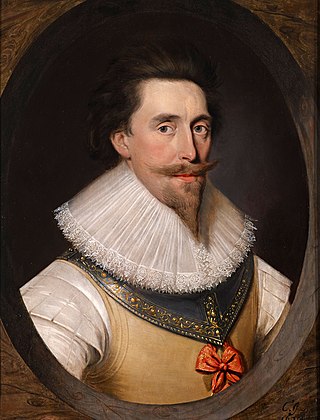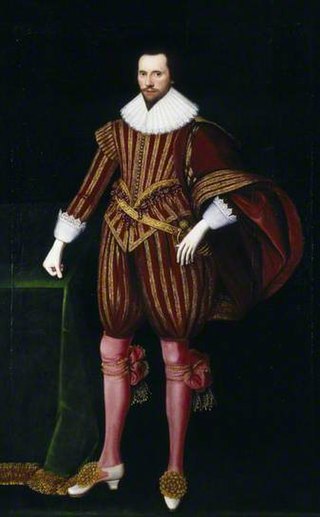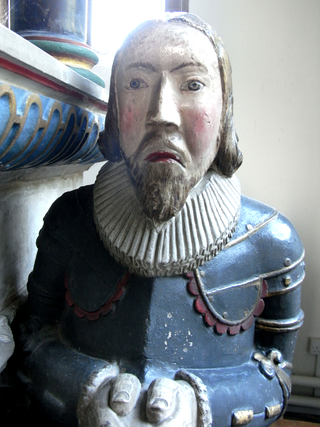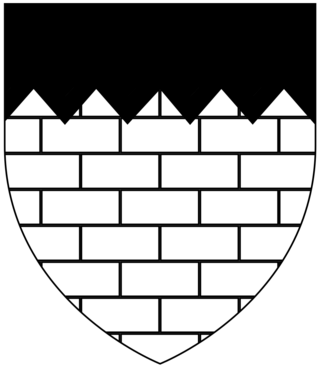Related Research Articles

Henry Cary, 1st Viscount Falkland, KB, PC was an English landowner and politician who sat in the House of Commons from 1601 to 1622. He was created Viscount Falkland in the Scottish peerage in 1620. He was Lord Deputy of Ireland from 1622 until 1629.

Seymour, Semel or St. Maur, is the name of an English family in which several titles of nobility have from time to time been created, and of which the Duke of Somerset is the head.

Edward Seymour, 1st Earl of Hertford, 1st Baron Beauchamp, KG, of Wulfhall and Totnam Lodge in Great Bedwyn, Wiltshire, of Hatch Beauchamp in Somerset, of Netley Abbey, Hampshire, and of Hertford House, Cannon Row in Westminster, is most noted for incurring the displeasure of Queen Elizabeth I by taking part in more than one clandestine marriage.

Francis Fane, 1st Earl of Westmorland, of Mereworth in Kent and of Apethorpe in Northamptonshire was an English landowner and politician who sat in the House of Commons between 1601 and 1624 and then was raised to the Peerage as Earl of Westmorland.

Francis Seymour, 1st Baron Seymour of Trowbridge, of Marlborough Castle and Savernake Park in Wiltshire, was an English politician who sat in the House of Commons at various times between 1621 and 1641 when he was raised to the peerage as Baron Seymour of Trowbridge. He supported the Royalist cause during the English Civil War.

Sir Edward Phelips was an English lawyer and politician, the Speaker of the English House of Commons from 1604 until 1611, and subsequently Master of the Rolls from 1611 until his death in 1614. He was an elected MP from 1584, and in 1588, following a successful career as a lawyer, he commissioned Montacute House to be built as a Summer house for himself and his family. He was knighted in 1603 and one of his major roles was as the opening prosecutor during the trial of the Gunpowder Plotters.

Sir Edward Seymour, 1st Baronet of Berry Pomeroy, Devon, was Member of Parliament for Devon, twice High Sheriff of Devon and an Army Colonel.

Sir Francis Popham (1573–1644) of Wellington, Somerset and Littlecote, Berkshire, was an English soldier and landowner who was elected a Member of Parliament nine times, namely for Somerset (1597), Wiltshire (1604), Marlborough (1614), Great Bedwin (1621), Chippenham 1624, 1625, 1626, 1628–29), and for Minehead (1640–1644).

Sir Edward Hungerford (1596–1648) of Corsham, Wiltshire and of Farleigh Castle in Wiltshire, Member of Parliament, was a Parliamentarian commander during the English Civil War. He occupied and plundered Salisbury in 1643, and took Wardour and Farleigh castles.
Edward Kyrton, or Edward Kirton (1585–1654), was an English politician who sat in the House of Commons variously between 1624 and 1645. He supported the Royalist side in the English Civil War.

Sir John Strangways of Melbury House, Melbury Sampford, Somerset, and of Abbotsbury in Dorset, was an English politician who sat in the House of Commons variously between 1614 and 1666. He supported the Royalist side in the English Civil War.
Sir William Uvedale was an English politician who sat in the House of Commons at various times between 1614 and 1645. He supported the Royalist cause in the Civil War.
Sir Edmund Carey was an English MP from 1584 to 1614.
Sir Peter Manwood (1571–1625) was an English politician who sat in the House of Commons at various times between 1589 and 1621.

Sir William Strode (1562–1637) of Newnham in the parish of Plympton St Mary, Devon, England, was a member of the Devon landed gentry, a military engineer and seven times a Member of Parliament elected for Devon in 1597 and 1624, for Plympton Erle in 1601, 1604, 1621 and 1625, and for Plymouth in 1614. He was High Sheriff of Devon from 1593 to 1594 and was knighted in 1598. In 1599 he was appointed Deputy Lieutenant of Devon. There is a monument to him in the parish church of Plympton St Mary.

Sir Henry Glemham was an English politician who sat in the House of Commons at various times between 1593 and 1622.
Sir Henry Poole was an English landowner and politician who sat in the House of Commons at various times between 1597 and 1626.
Sir Edmund Ludlow was an English landowner and politician who sat in the House of Commons at various times between 1571 and 1622.

Sir Carew Reynell was an English courtier, soldier and politician who sat in the House of Commons at various times between 1593 and 1622.
Lawrence Hyde I was an MP who founded the influential Hyde family of Wiltshire. He was the great-great-grandfather, through his son Henry Hyde, of two British monarchs, Queen Mary II and Queen Anne.
References
- Booth, Muriel (1981), "Kirton, James I (d.1620), of Almsford Park, Somerset", in Hasler, P.W. (ed.), The History of Parliament: the House of Commons 1558-1603, Boydell and Brewer